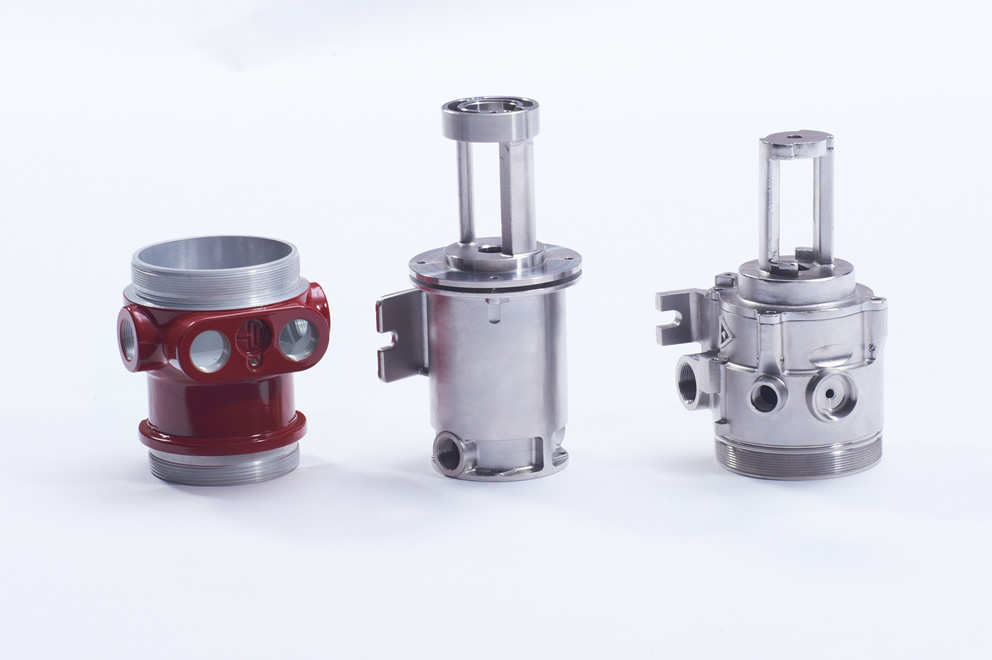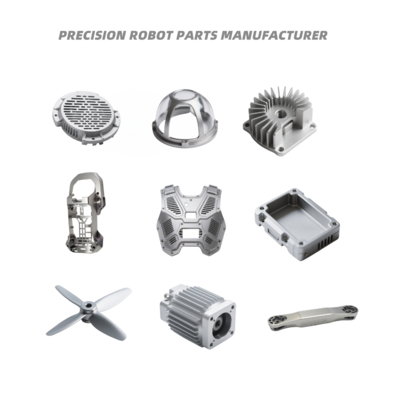Tips for selecting a trusted Aluminum Casting Company with credibility
Wiki Article
Discovering the Ingenious Procedures Behind Modern Light Weight Aluminum Factory Workflow
Modern light weight aluminum factory procedures are undertaking significant transformation. Automation and AI are improving production methods, boosting both effectiveness and precision. The assimilation of 3D printing is improving mold and mildew creation, while sustainability techniques are coming to be more important. Each of these improvements plays an essential role in redefining the market. The ramifications of these adjustments expand past mere production performance. What chances and obstacles lie ahead for aluminum shops in this evolving landscape?The Duty of Automation in Light Weight Aluminum Foundries

Automation adds to enhanced safety and security standards within the foundry setting. By transferring hazardous jobs to machines, human workers can concentrate on supervisory roles and quality assurance, decreasing the threat of accidents. On top of that, data analytics originated from automated procedures provide useful insights right into functional efficiency, resulting in far better decision-making and continuous renovation. As the need for light weight aluminum items expands, the fostering of automation technologies will likely broaden, better changing the landscape of light weight aluminum factory operations.
Innovations in Casting Technologies
Current advancements in casting innovations are transforming light weight aluminum factory procedures. Technologies such as 3D printing combination, advanced alloy solutions, and automated process optimization are enhancing performance and item top quality. These growths are pivotal in satisfying the evolving needs of the market.3D Printing Combination
Integrating 3D printing modern technology right into aluminum foundry procedures has actually changed standard spreading approaches, improving both performance and precision. This ingenious strategy permits the fast manufacturing of complex molds and cores, greatly minimizing lead times and material waste. By making use of additive manufacturing, factories can produce intricate geometries that were impossible or formerly tough to achieve with standard strategies. The versatility of 3D printing likewise makes it possible for quick layout modifications, promoting an extra dexterous manufacturing procedure. Furthermore, this integration supports using lightweight structures, which is significantly important in markets such as vehicle and aerospace. As aluminum shops continue to take on 3D printing, they place themselves at the leading edge of technical development, driving enhancements in product top quality and operational abilities.Advanced Alloy Formulations
The growth of innovative alloy solutions has considerably improved casting technologies in aluminum factory operations. These formulas integrate various elements, such as magnesium, silicon, and copper, to improve mechanical properties and thermal resistance. By tailoring the structure of aluminum alloys, producers can accomplish specific efficiency characteristics that fulfill the demands of diverse applications, from automobile parts to aerospace structures. The use of innovative alloys also adds to reduced weight and enhanced stamina, which are essential factors in modern-day design. In addition, developments in alloy development make it possible for better fluidity throughout casting, leading to improved surface area coatings and reduced problems. Generally, progressed alloy formulas represent a significant jump ahead, placing light weight aluminum shops to fulfill the evolving requirements of numerous industries successfully.Automated Refine Optimization
Advancements in casting modern technologies have actually led the method for automatic procedure enhancement in light weight aluminum foundry operations. By integrating advanced software application and real-time information analytics, shops can now enhance manufacturing processes and improve quality assurance. Automated systems monitor variables such as stress, air conditioning, and temperature level prices, enabling instant modifications that lessen issues and waste. Furthermore, equipment knowing algorithms assess historic efficiency data to forecast ideal setups, thus boosting effectiveness and minimizing cycle times. Robotics additionally play a substantial duty, taking care of repeated tasks that improve security and precision. Overall, these advancements not just drive functional efficiency yet likewise make it possible for shops to satisfy the expanding need for high-quality light weight aluminum elements in various markets.Smart Production and Industry 4.0 Combination
The combination of Smart Manufacturing and Sector 4.0 within aluminum foundries is changing functional effectiveness. By leveraging IoT modern technologies, automation, and robotics, foundries can enhance manufacturing processes and reduce downtime. In addition, information analytics offers crucial insights that enhance decision-making and drive continual enhancement.IoT in Factory Procedures
As producers progressively welcome the Net of Things (IoT), foundry operations are experiencing a transformative change in the direction of clever manufacturing and Industry 4.0 combination. Aluminum Casting Company. IoT modern technologies allow real-time information collection and evaluation, boosting decision-making procedures and operational efficiency. Sensors and connected devices monitor equipment efficiency, product use, and environmental problems, permitting positive upkeep and source optimization. This connectivity promotes a much more nimble manufacturing environment, where modifications can be made quickly in reaction to market demands. In addition, IoT facilitates improved traceability and high quality control, as data from the whole production cycle can be easily accessed and evaluated. In general, the assimilation of IoT in factory operations substantially enhances efficiency and drives innovation in aluminum production processesAutomation and Robotics Assimilation
Automation and robotics integration is transforming aluminum foundry operations by boosting performance and accuracy. This transformative approach improves processes such as molding, putting, and ending up, decreasing human mistake and enhancing outcome consistency. By employing innovative robotic systems, factories can attain greater production rates while maintaining strict quality requirements. Automated systems also allow real-time tracking and adaptive control, permitting for swift changes to production criteria. Furthermore, the assimilation of robotics decreases labor expenses and minimizes safety risks related to manual handling of molten metal. As foundries embrace clever manufacturing that site principles inherent in Industry 4.0, the synergy in between automation and robotics strengthens their competitive edge, leading the way for lasting growth and technology in the light weight aluminum casting field.Information Analytics for Performance
Taking advantage of data analytics substantially enhances this content performance within aluminum shop operations, aligning with clever manufacturing and Industry 4.0 principles. By leveraging real-time information collection and analysis, foundries can monitor manufacturing procedures, anticipate equipment failings, and optimize source allowance. This data-driven method assists in insightful decision-making, allowing supervisors to boost and determine traffic jams process. Furthermore, anticipating analytics empowers foundries to expect market demands, thus minimizing waste and making sure timely item shipment. Integration of data analytics with IoT gadgets improves operational exposure, cultivating an aggressive upkeep society. Inevitably, executing these advanced logical methods not just improves efficiency however additionally drives advancement, placing aluminum shops to satisfy the developing needs of the market while maintaining one-upmanships in a quickly altering landscape.Lasting Practices in Aluminum Spreading
While the aluminum casting sector has typically encountered ecological challenges, numerous factories are now adopting sustainable techniques to reduce their influence (Aluminum Foundry). A significant emphasis has actually gotten on reusing light weight aluminum scrap, which not only reduces waste yet additionally conserves energy compared to main light weight aluminum manufacturing. Innovative melting innovations, such as induction heaters, enhance energy effectiveness and reduced greenhouse gas dischargesFurthermore, factories are carrying out closed-loop water supply to lessen water consumption and lower thermal air pollution. The usage of environment-friendly binders in mold-making processes is obtaining grip, further lowering unsafe exhausts.
Furthermore, some facilities are spending in renewable power sources to power operations, aligning with global sustainability goals. By incorporating these methods, the aluminum spreading industry is advancing towards an extra environmentally liable future, showing that economic growth can exist side-by-side with environmental stewardship - Aluminum Foundry. These initiatives show a dedication to sustainability and the significance of ecological liability in production
Quality Assurance Innovations
As the light weight aluminum casting sector advances in the direction of sustainability, the significance of quality assurance advancements becomes increasingly noticeable. Modern light weight aluminum shops are adopting advanced modern technologies to improve their quality control procedures. Techniques such as real-time tracking and data analytics allow producers to spot incongruities and problems early in the manufacturing cycle. Applying automated evaluation systems geared up with device finding out algorithms assurances that products satisfy rigorous quality standards while reducing human mistake.Additionally, the combination of non-destructive screening methods, such as ultrasonic and radiographic assessments, provides much deeper insights into the honesty of castings without harming the product. These developments not just enhance item dependability but also reduce waste, aligning with sustainability goals. Furthermore, the fostering of standard quality structures assists simplify procedures across different foundries, guaranteeing consistency in output. Jointly, these developments are improving quality assurance, promoting a culture of excellence within the light weight aluminum spreading sector.
Future Patterns in Aluminum Factory Operations
What developments lie ahead for aluminum foundry operations? The future of light weight aluminum foundries is poised for click now improvement through improvements in automation, expert system, and sustainable methods. The assimilation of robotics and automated systems is anticipated to improve effectiveness and precision in the casting procedures, lowering human mistake and labor costs. In addition, AI-driven analytics will make it possible for real-time monitoring and predictive maintenance, enhancing functional performance and reducing downtime.Sustainability continues to be a prime focus, with factories progressively adopting eco-friendly methods, such as using recycled light weight aluminum and creating low-emission melting modern technologies. Innovations in 3D printing are also prepared for to transform mold-making, permitting complicated geometries and lowered material waste. As the market accepts digitalization, data-driven decision-making will end up being essential, making it possible for shops to respond swiftly to market needs. Collectively, these patterns promise to redefine aluminum foundry procedures, making them more effective, lasting, and versatile to future challenges.

Often Asked Questions
What Precaution Are Implemented in Aluminum Foundry Operations?
Light weight aluminum shop operations implement numerous precaution, including individual safety tools, air flow systems to handle fumes, normal safety and security training, emergency reaction plans, and stringent surveillance of temperature level and devices to stop accidents and warranty worker safety.Exactly How Do Shops Manage Workforce Training for New Technologies?

What Materials Are Commonly Reused in Aluminum Foundries?
Aluminum shops generally reuse scrap light weight aluminum, including post-consumer items like drink cans, automotive components, and building and construction products. This reusing process minimizes waste and conserves resources, adding to a much more lasting light weight aluminum production industry.Just How Does Light Weight Aluminum Spreading Impact the Atmosphere?
Aluminum casting impacts the environment through energy-intensive procedures, greenhouse gas exhausts, and potential regional pollution. However, developments in reusing and lasting techniques can reduce these impacts, advertising an extra eco-friendly technique to light weight aluminum manufacturing.What Are the Common Lead Times for Aluminum Spreading Projects?
Normal preparation for aluminum spreading projects differ substantially, generally varying from 2 to six weeks. Elements affecting these timelines include intricacy, order dimension, and product availability, affecting total production schedules in foundry operations.
Automation significantly plays a necessary duty in light weight aluminum factories, boosting efficiency and precision in the manufacturing procedure. Improvements in casting technologies have paved the way for automated procedure improvement in aluminum foundry operations. Using information analytics significantly improves effectiveness within light weight aluminum factory operations, aligning with wise production and Industry 4.0 principles. A considerable focus has been on reusing aluminum scrap, which not only reduces waste but additionally preserves power contrasted to primary light weight aluminum production. Light weight aluminum factories generally reuse scrap aluminum, including post-consumer products like drink cans, auto components, and construction products.
Report this wiki page